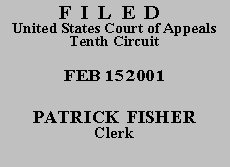

| UNITED STATES OF AMERICA,
Plaintiff-Appellee, |
|
| v. | |
| FRED DEXTER LEE,
Defendant-Appellant. |
|
Defendant Fred Dexter Lee, a federal prisoner appearing pro se, seeks a certificate of appealability to appeal the district court's dismissal of his 28 U.S.C. § 2255 habeas petition. We deny Lee's request for relief and deny his request to proceed in forma pauperis on appeal.
In 1986, Lee "walked away from the correctional institution where he was incarcerated by the state [of Oklahoma]." Tr. Dec. 12, 1986, at 4. On December 18, 1986, Lee pleaded guilty in Oklahoma federal court to aggravated bank robbery and was sentenced to thirteen years in prison. The oral and written records of sentencing were silent as to whether the federal sentence would be concurrent with or consecutive to his state sentence. Lee was returned to the state for completion of his state sentence on December 22, 1986. He was delivered to federal authorities on February 10, 1992, to commence serving his federal sentence.
On August 1, 1997, Lee filed a motion for clarification of sentence in Oklahoma federal court, contending the court was "very clear at sentencing" that his federal sentence was to run concurrently with his state sentence. In denying the motion, the district court found that clarification was not required because "both the prevailing presumption in the Tenth Circuit at the time the defendant was sentenced and the applicable statute dictated that the defendant's federal sentence would run consecutively to any state sentence he served." Doc. 45 at 1-2 (internal citations omitted).
Lee filed a 28 U.S.C. § 2241 habeas petition in Colorado federal court, the state where he was confined, contending he should have been released on December 18, 1999, because his federal sentence was concurrent with his state sentence. The court dismissed the petition, holding Lee had an adequate and effective remedy under 28 U.S.C. § 2255. Lee filed a § 2255 petition in Oklahoma federal court, again asserting his federal sentence should have expired on December 18, 1999. The district court denied the petition because Lee had already raised the issue, and the petition was time barred under the Anti-Terrorism and Effective Death Penalty Act.
Lee is in effect claiming he is entitled to immediate release. "A claim to immediate release on the ground that a federal sentence has been served in full is a matter properly raised in a 28 U.S.C. § 2241 petition for a writ of habeas corpus." United States v. Scott, 803 F.2d 1095, 1096 (10th Cir. 1986).
We recognize that Lee filed this § 2255 action in Oklahoma federal court because the Colorado federal court dismissed his § 2241 action after finding he had an adequate remedy under § 2255. A petition under 28 U.S.C. § 2241 must be filed in the district where the prisoner is confined. See Haugh v. Booker, 210 F.3d 1147, 1149 (10th Cir. 2000).
Jurisdictional defects that arise when a suit is filed in the wrong federal district may be cured by transfer under the federal transfer statute, 28 U.S.C. § 1631, which requires a court to transfer an action "if the transfer is in the interest of justice." Id. at 1150. We are "authorized to consider the consequences of a transfer by taking 'a peek at the merits' to avoid raising false hopes and wasting judicial resources that would result from transferring a case which is clearly doomed." Id. We proceed to examine the merits of Lee's contentions.
Lee's assertion that the presumption of a concurrent sentence arises when the record is silent as to whether the sentence is concurrent or consecutive was addressed in the denial of his motion for clarification in 1997. In United States v. Earley, 816 F.2d 1428 (10th Cir. 1987), the court recognized that before November 1, 1987, "'[a]bsent clear language to the contrary, it is presumed that sentences imposed on more than one offense at the same time, or at different times, will run concurrently.'" 816 F.2d at 1430 (citing Subas v. Hudspeth, 122 F.2d 85 (10th Cir. 1941)). This rule only applied to situations where there were multiple federal sentences. See id. Here the issue is whether a federal sentence should run concurrently with a state sentence.
Federal sentences imposed before November 1, 1987, "shall commence to run from the date on which such person [was] received at the penitentiary, reformatory, or jail for service of said sentence." 18 U.S.C. § 3568; Taylor v. Baker, 284 F.2d 43, 44 (10th Cir. 1960). Since a federal sentence begins when an inmate arrives at a federal institution, the presumption that sentences are to run concurrently "does not operate . . . if one sentence is from federal court and the other from a state court." Causey v. Civiletti, 621 F.2d 691, 693 n.2 (5th Cir. 1980).
Our review of the record and the briefs on file convinces us that Lee is not entitled to relief under 28 U.S.C. § 2241, and that transfer of this action would therefore not be in the interest of justice. We DENY Lee's request for relief. The request to proceed in forma pauperis on appeal is DENIED.
Entered for the Court
Mary Beck Briscoe
Circuit Judge
*.This order and judgment is not binding precedent, except under the doctrines of law of the case, res judicata, and collateral estoppel. The court generally disfavors the citation of orders and judgments; nevertheless, an order and judgment may be cited under the terms and conditions of 10th Cir. R. 36.3.